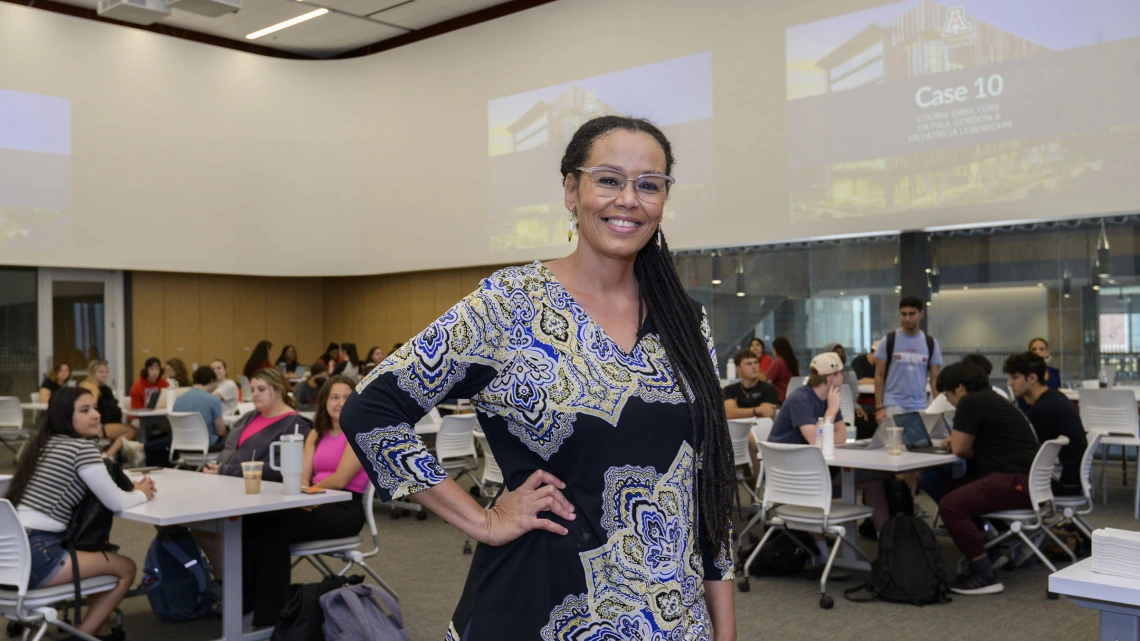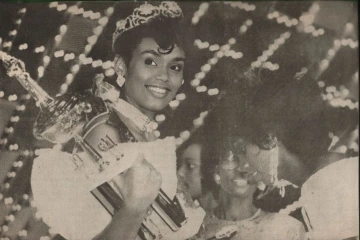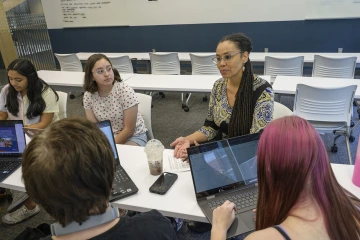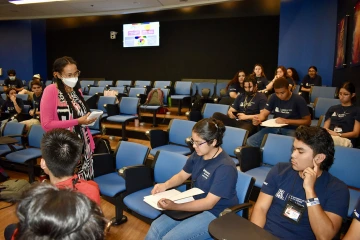These are the JEDI nurses Dr. Tarnia Newton is looking for…
Once a Miss World beauty pageant contestant, the nursing faculty member sees cultural humility at the core of justice, equity, diversity and inclusion.

The University of Arizona College of Nursing’s Tarnia Newton, DNP, FNP-C, said she believes all nurses have a calling to advocate for their patients through justice, equity, diversity and inclusion.
It’s not a long time ago, nor in a galaxy far, far away, but Tarnia Newton, DNP, FNP-C, has wanted to be a nurse nearly her entire life. And now as a clinical assistant professor in the University of Arizona College of Nursing, she sees all nurses as Jedi warriors, fighting for their cause – in this case advocating for patients in their quest for affirmative, better health care.

Tarnia Newton, DNP, FNP-C, an assistant professor at the UArizona College of Nursing, was Miss Commonwealth Bahamas 1991. She used the scholarship award to train as a nurse. (Photo courtesy Tarnia Newton)
“Everyone’s all about Star Wars, and I truly believe in being a JEDI nurse,” Dr. Newton said. “We need to be warriors advocating to break down those walls when we think of systemic racism, when we think of inequities, on behalf of our patients. That is the new nurse who is going to serve this nation in the sense of breaking barriers to social determinants of health.”
For Dr. Newton, being a JEDI nurse means being involved in the community and addressing inequities and disparities. “We need to develop nurses with the capacity to transform communities,” she said recently.
All of life involves risks
The desire to help others began early for Dr. Newton, a native of Freeport, The Bahamas. While she knew early on she wanted to be a nurse, circumstances redirected her from it for several years to follow in her father’s footsteps.
“He was a business entrepreneur,” she said. “At one point before the age of 5, I lived in Haiti because he was doing a hotel venture. So, he was just one of those people who took risks, big risks,” and did well for his family.
Her parents sent her to a Baha’i-based boarding school in India when she was 8. Dr. Newton returned at age 13 for high school, bringing back a slight “desi” or Indian accent and experience with Bharatanatyam, an Indian classical dance style. She taught the style to classmates for a school play set to a calypso song. After graduating at 15, she also attended a Baha’i college in Michigan.
When Dr. Newton was 18, her father died. She came home from Michigan and was working as a bank finance officer a year later, when family prompted her to compete in the 1991 Miss Commonwealth Bahamas contest to earn a scholarship to continue college.
She won the contest, the scholarship and trips to London, Portugal, South Africa, and New York City as a Bahamian ambassador. She was in high demand as an official ribbon-cutter locally as well. And she got to compete in the Miss World contest in Atlanta, the first time the pageant was held in North America.
“Actually, the only reason why I did that was the scholarship they were offering,” Dr. Newton said. “But it was a life-changing experience, not only because of all the places I got to go, but the platform it gave me to express myself. I really enjoyed it in that sense because I was in the community doing things that were needed at the time.”
Rather than return to college, she pursued business ventures that included manufacturing in India, wholesaling ready-made garments and exporting lobster from the Bahamas to the U.S.
Finding her voice in nursing
Six years later, she activated her pageant scholarship and became a licensed practical nurse in Miami through the Mercy Hospital School of Nursing. There, she also attended Miami Dade Community College where she earned her associate’s degree in nursing in 2001.

Dr. Tarnia Newton leads pre-medicine students in a group discussion about how they would help an elderly patient who does not want to lose their independence but is showing signs of mental health issues.
Over that time, she held almost every job you could do in nursing, initially as a travel nurse working her way across the country. That included a revelatory practicum in an underserved clinic on Oklahoma’s Cherokee Nation, reinforced later by an experience in San Antonio with an older Cherokee woman who, in a spiritual moment, told Dr. Newton she was sent by her grandfather to care for her. On the other extreme, she also worked as a nurse in the Bahamas, a luxury experience at a Sandals five-star resort.
“When I think of my nursing career, it’s been vast,” Dr. Newton said. “I used to do home health with pediatrics. I’ve worked extensively in critical care and care for older adults. It all goes back to I really like working in community, as a nurse and as an individual, urban or rural. And when I became a family nurse practitioner, that was one of the reasons why.”
These are the JEDI we were looking for
Since arriving at UArizona three years ago, she has quietly worked under the radar to achieve change. “That’s just me. I just always consider myself a whisperer,” making suggestions embraced by others, Dr. Newton said. She has been integral to the move toward expanding equity, diversity and inclusion at the College of Nursing as well as the broader Health Sciences and UArizona campus. These are the nurses you are looking for.

Tarnia Newton, DNP, FNP-C, instructs high school students in the Med-Start Health Careers Program, a six-week summer academic enrichment camp to improve access to health professions for those from underserved communities.
Dr. Newton was nominated for the Pride Alliance leadership post she shares with the R. Ken Coit College of Pharmacy’s Elizabeth Hall-Lipsy, JD, MPH, due to her work introducing JEDI Safe Zone Training into the college’s Doctor of Nursing Practice general orientation and coursework. In 2022, she won two related grants for that training to make the college a safer, more welcoming and inclusive environment for members of the lesbian, gay, bisexual, transgender and queer community. She’ll teach a new JEDI Health Equity course called Connection, Community, & Healing in Urgent Times this fall, a result of participating in the Culturally Responsive Curriculum Development Institute and being an Experiential Learning Design Accelerator Fellow. The course has a service-learning component for students.
“A lot of times in nursing, they talk about ‘cultural competency,’ and I’m not a lover of that phrase,” she said. “I think it’s really cultural humility where we need to focus. That’s really a personal lifelong commitment to understanding, self-evaluating and learning about somebody else’s culture, their beliefs, their identities. It’s very important to have humility when you’re coming to a culture as a novice, and a willingness to learn. It’s about always being open and being a lifelong learner.”
That’s the JEDI warrior way.

